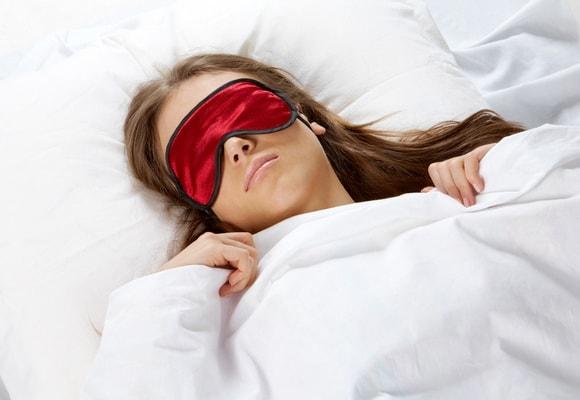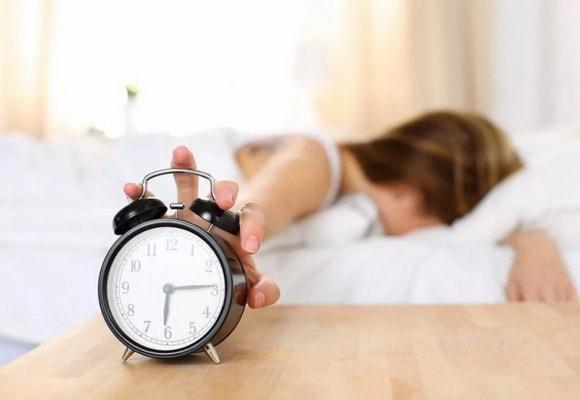Optimal sleep duration per day
Sound and full sleep is the key to good health. Therefore, many are interested in the question of how much a person should sleep in order to feel alert and full of energy.
Night rest is a unique and very important physiological process, which is still not fully understood today. However, one thing is known for sure, sleep is necessary for the restoration of the work of all systems of the human body and if, for any reason, night rest is disturbed, the consequences can be catastrophic.

What is healthy sleep? With the advent of the child into the world, parents teach him to observe the daily routine and develop such concepts as the day is intended for wakefulness, and the night for a good rest of the body.
Important: In a dream, many different processes occur in the human body that have a positive effect on all systems and organs. In addition, the body gets rid of daytime fatigue and improves tone.
Initially, the child adheres to the daily routine. However, as you get older, the habits you develop during childhood change. Night rest takes less time, and the daily load becomes greater.
And at this moment, the main task of a person is to rebuild his regime of rest and work in such a way that the body recovers. And if in the morning you wake up with a feeling of cheerfulness, then the chosen time for sleep is optimal.
How to create a good rest
Sound sleep is the key to human health and longevity. But how to work out the optimal mode? To do this, we suggest using the recommendations of experts:
- We adhere to the optimal mode. Try to go to bed and wake up at the same time every day, regardless of weekend or vacation. This approach will help to set the correct functioning of the biological clock.
- We plan time for sleep. An adult spends from 6 hours 30 minutes to 8 hours a day sleeping. But, not only sleep time has an impact, the quality component of rest plays an important role. In other words, normally a person sleeps without waking up.
- Waking up in the morning, try to reduce the time of getting up. Don't stay in bed for long periods of time. Otherwise, you can fall asleep again, and this will negatively affect the coming day. A warm-up in bed helps well, it will invigorate and positively set you up for the whole working day.
- If you want to sleep well, spend two hours in a calm atmosphere before the planned rest. Refuse to watch programs and films with a negative plot. Avoid physical activity as well.
- To sleep well at night, give up daytime sleep. Of course, 30 minutes of a lunch nap will give strength and put your thoughts in order. However, people prone to insomnia, it is better to refuse to rest during the day.
- Physical activity and a colossal flow of information are recommended to fill life during daylight hours. But when the evening comes, it's time to relax and unwind.
- Smoking, drinking too much coffee and alcohol guarantee sleep deprivation and health problems. If there is no will to completely say goodbye to your habits, try to minimize them.
For a healthy rest, make it a habit to think positively before going to bed, ventilate the bedroom, isolate extraneous sounds, so that there is silence in the room and create darkness. This will help you fall asleep quickly and make your sleep deeper.

Approximate norms of healthy sleep
What is the optimal amount of sleep for a person per day? Here it is immediately worth highlighting, there is no exact data that must be strictly adhered to. Every woman and man has a very individual rest rate. Moreover, if a person has certain pathologies, he needs a long rest. Because sleep has a healing effect on the body.
Important: Each person should, first of all, be guided by his own well-being, in such a matter as how long his rest should last.
The duration of night rest is influenced by both subjective reasons and the human factor. Therefore, scientists have come to a common opinion, it is recommended to take 8 hours of sleep normally.
How holidays change with age
Age has a huge impact on the duration of rest. Below is a table that clearly describes the age category of people and the average duration of their sleep.
In addition, scientists have found that the fluctuation in the duration of night rest negatively affects not only its quality, but also the general condition of a person.

In other words, if you stick to a certain amount of sleep time, you will feel alert and in good health, but if the sleep duration is different, the negative effects will follow almost immediately.
Important: There is an opinion that women need to rest more than the stronger sex. However, scientists believe that it is necessary to allocate the same time.
It does not matter gender, rest should be built on the basis of their professional activities. People involved in mental work need a long rest. But workers involved in specialties that require more physical activity can sleep less.

When is the most beneficial time for sleep?
Normal rest largely depends on the chosen time. Many people believe that if they go to bed well after midnight and wake up close to eleven o'clock, they will completely fill the need for rest.
In fact, this opinion is fundamentally wrong. The optimal time for restoring the body's strength is from 22:00 -23:00 to 6:00 - 7:00 in the morning. It is at this time that the process of cell regeneration of all systems and organs starts. In addition, rest at this time helps to rejuvenate the skin and restore the central nervous system.
Is it bad to sleep during the day
Today, many European countries practice long daytime rest. This is due to the peculiarities of the climatic zone. Yes, and a nap at lunchtime has a number of positive aspects:
- a rested person improves visual memory;
- mental concentration is restored;
- increased efficiency;
- comes a good influx of energy.
The main thing is not to overdo it with daytime naps. An effective result can be obtained from a 30-minute rest, anything that will provoke more nighttime insomnia. In addition, the person will experience symptoms such as:
- lethargy;
- headache;
- apathy.
This also applies to sleep at sunset. It is believed that falling asleep between 17:00 and 18:00 hours will negatively affect your condition. Therefore, doctors advise not to go to sleep at this time, even if you really want to. Endure drowsiness and lie down closer to the night.

Can I eat before bed
The quality of rest is greatly influenced by the use of food. The task of each person is to correctly schedule food intake throughout the day. It is important to leave healthy foods for dinner.
Today there is an opinion that the last meal should be no later than 18:00. Actually this is not true. If you go to bed on an empty stomach, health problems will arise in the near future. Moreover, after waking up, there can be no talk of energy, and the dream itself will not be complete.
2 hours before the planned rest, doctors recommend taking light foods. They will not harm the body, on the contrary, the benefits of such a snack will be invaluable.
In order not to feel heaviness in the stomach, eat the following food groups:
- dairy products;
- chicken and turkey meat;
- boiled eggs;
- vegetable or fruit salads;
- seafood.
Such food will even help to normalize a good sleep. And what is important, the brain will receive good nourishment for the regeneration of systems and organs at night.
Consequences of lack of sleep and oversleeping
Why is not only lack of sleep dangerous, but also oversleeping? Let's start with the fact that there are 24 hours in a day, ideally people should spend 8 hours on:
- work processes;
- rest;
However, in reality, few adhere to such a schedule. Moreover, as a rule, more often decreases or increases the time for recovery. The fact is that some people prefer to solve a number of tasks by reducing the duration of sleep.

But others, on the contrary, prefer to go to bed much earlier than the allotted time. As a result, we have lack of sleep or oversleeping, which equally negatively affect our well-being, manifesting itself with the following symptoms:
- isolation, lethargy and apathy;
- a sharp decrease in the production of serotonin, as a result of which a person begins to suffer from depression;
- the appearance of nervousness and irritability;
- decrease in working capacity;
- decrease in mental abilities;
- premature aging;
- deterioration in physical fitness;
- failure of almost all important body systems.
These are the consequences of chronic lack of sleep. However, oversleeping also has a number of consequences, namely:
- drowsiness observed throughout the day;
- depression;
- swelling of the body due to a long stay of the body in one position;
- overweight problems.
As we can see, the lack and abuse of night rest equally affects the human body negatively. Therefore, doctors recommend calculating the optimal norms for your body and sticking to them. And to make it easier for yourself, use the online calculator.
It is important to understand that the right time for rest guarantees a person a good rest. What's more, you'll wake up refreshed and well-rested in the morning. Moreover, this positive charge will remain throughout the day.

Learning how to wake up early
So, how much sleep do you need to feel rested, we found out. Now let's dwell on another important issue, how to teach the body to fall asleep and wake up in the morning correctly.
If a person wakes up in the early morning refreshed and refreshed, he can do a lot of useful things without getting tired. Since at this time the performance is the highest. But, to achieve this state, first you need to find out how much an adult needs to sleep per day. In addition, a lot depends on the following factors:
- what time did the person go to rest in the evening;
- what phase of sleep occurs at the time of awakening.
In general, if you fall asleep at 22:00 and wake up at 6:30, you will feel a surge of vivacity. Since with such a schedule, a short stage of sleep occurs during this period, which is suitable for awakening.
In addition, there are rules, adhering to which you can wake up early and correctly in the morning:
- optimal indicators of humidity and air will help you feel more cheerful after waking up. According to Dr. Komarovsky, regular airing, dusting and moistening the bedroom will make early awakening easy;
- set an alarm clock and put it a few meters away. This cunning trick will make you wake up in the morning from the sound and overcome the distance to turn off;
- if using the alarm clock fails to accustom the body to early awakenings, ask your relatives to call at a certain time;
- after waking up, take a shower and drink green tea with honey and lemon.
It will take about two weeks to form the habit of waking up early in the morning, then the body will turn on the biological alarm clock and wake up without difficulty.











